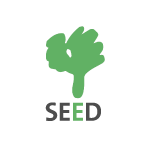FOR EVERY WOMAN
PHOTO EXHIBITION
November 25 – December 10, 2022 / 10am-5pm
Location: Erbil Citadel, Cultural Center
“For Every Woman” is a tribute to the strength and commitment of every woman in Kurdistan who strives to enrich and build strong communities that foster equality and growth.
In a region marred by conflict, violence, and instability, people have demonstrated time and time again their resilience and perseverance. For women, barriers constructed by social stigma and engrained cultural norms that have dictated their mobility, limited their capacity to contribute and lead, and often turned down the volume on their critical needs, have also led to disproportionate and alarmingly high levels of gender-based violence (GBV) and femicide.
In the first 6 months of 2022, the number of reported “honor” killings surpassed the annual total for 2021. While this terrifying upsurge might also indicate an increase in public awareness and concern for GBV, the senseless killing of a reported 30 women is not only an assault on their human rights, but also a devastating loss for their families, and ultimately for Kurdistan’s society.
“For Every Woman” not only highlights the talents, skills, and progress that women have made despite ongoing challenges, but also the contribution of others – women, men, and children – to their success. This collection, curated by Kurdish and foreign photographers from Iraq’s premiere photo agency, Metrography, is the physical manifestation of what peaceful and supportive coexistence can achieve. Men and women photographers came together to build the beautiful narrative before you.
These stories of strong, courageous, and inspirational women in Kurdistan are only a few of many. “For Every Woman” is a window into the myriad contributions of some of Kurdistan’s inspirational women, as seen through the lens.
Investing in women is critical to achieving a more equitable and prosperous future, one in which half of humanity is an equal partner in solving the problems of climate change, political conflict, economic growth, disease prevention, and global sustainability. Collective and consistent action is needed to stop GBV, including femicide. Support us today.
This exhibition was made possible with the generous support of the United States Government.
#StopGBVNow #AStepForward #ForEveryWoman
(بۆ هەموو ژنێک) شتایشکردنی هێز و پابەندبوونی هەموو ژنانە لە کوردستان کە کۆشش دەکەن لەپێناو دەوڵەمەندکردن و بنیاتنانی کۆمەڵگەی بەهێز کە دادپەروەری و گەشەسەندن لەخۆ دەگرێت.
لە هەرێمێک کە ململانێ و توندوتیژی و ناسەقامگیری زۆری بەخۆیەوە بینیوە، خەڵکی هەمیشە خۆڕاگر بوونە. بۆ ژنان، ئەو بەربەستانەی بەهۆی پەڵەی کۆمەڵایەتی و نەریتی کەلتووریی چەسپاوە کە جووڵە و توانایانی سنوردار کردووە لە بەشداریکردن و پێشڕەوی و پڕکردنەوەی پێویستییەکانیان، بۆتە هۆی هاتنە کایەی ئاستێکی بەرز و مەترسیداری توندوتیژی لەسەر بنەمای جۆری کۆمەڵایەتی و ژن کوژیی.
لە شەش مانگی سەرەتای ئەم ساڵدا، ژمارە تۆمارکراوەکانی کوشتن لەسەر بنەمای ئابڕوو (شەرەف) کۆی کوشتنەکانی ساڵی ٢٠٢١ ی تێپەڕاندووە. هەرچەندە دەکرێت ئەم بەرزبوونەوە ترسناکە ببێتە هۆیەک بۆ بڵندبوونەوەی هوشیاری لە بارەی توندوتیژی لەسەر بنەمای جۆری کۆمەڵایەتییەوە، بەڵام کوشتنی بێ بەزەییانەی (٣٠) ژن نەک تەنها هێرشە لەسەر مافی مرۆڤ، بەڵکو زیانێکی گەورەیە بۆ کەسوکاریان و بۆ کۆمەڵگەی کوردی.
(بۆ هەموو ژنێک) تەنها تیشک ناخاتە سەر بەهرە و کارامەیی و بەرەوپێشچوونەکانی ژنان سەرەڕای ئاڵنگارییە بەردەوامەکان، بەڵکو بەشداری کەسانی دیکەشی لەخۆگرتووە وەک ژنان و پیاوان و منداڵان لە سەرکەوتنیان. ئەم بەرهەمانە، کە فۆتۆگرافەری کوردی و بیانی لە ئاژانسی مێترۆگرافی بەرهەمیان هێناوە ئاماژەن کە تەبایی و پێکەوە ژیان دەتوانێت چی بەدەست بێنێت. فۆتۆگرافەری ژن و پیاو پێکەوە کاریان کردووە بۆ دروستکردنی ئەم بەرهەمە جوانانە.
چیرۆکی ئەم ژنە بەهێز و ئازا و سروشبەخشانەی کوردستان تەنها چەند دانەیەکن لە کۆمەڵێکی زۆرتر. (بۆ هەموو ژنێک) پەنجەرەیەکە بۆ کۆمەڵێکی زۆر گەورە لە بەشداری ژنان لە کوردستان.
وەبەرهێنان لە ژنان زۆر گرنگە بۆ بەدەستهێنانی داهاتوویەکی دادپەروەر و ئاوەدان، داهاتوویەک کە نیوەی مرۆڤایەتی هاوبەشێکی یەکسانن لە چارەسەرکردنی کێشەکانی ژینگە، ململانێی سیاسی، گەشەی ئابوری، رێگریکردن لە نەخۆشی، و بەردەوامیی جیهانیی. هەماهەنگی و بەردەوامی پێویستە بۆ وەستاندنی توندوتیژی لەسەر بنەمای جۆری کۆمەڵایەتی وەک ژن کوژیی. پاڵپشتمان بە.
ئەم پیشانگایە بە پاڵپشتی حکومەتی ویلایەتە یەکگرتووەکانی ئەمریکاوە رێکخراوە.
#توندوتیژی_جێندەریی بوەستێنە #هەنگاوێک_بۆ_پێشەوە #بۆ_هەموو_ژنێک
Jwana Abubakir
Every day, millions of clothing garments are discarded and sent to landfills. Fast fashion has created a culture of “disposable” clothing, resulting in accelerated manufacturing that produces close to 10% of all global carbon emissions each year. If this trend continues unabated, the cost to our environment could be devastating.
Jwana started her clothing upcycling project, Nwe Conic, two years ago. Jwana receives donations of old clothes which she then reuses and recycles to create new garments. She also incorporates everyday materials into her designs.
Her project aims to help protect the environment by reusing materials and reducing textile waste. This project offers a new way of creating fashion that is innovative, unique, and authentic. Jwana’s message is to inspire others not to throw away their old clothing, but to reuse materials creatively instead of spending money on new clothes.
“It is time for all of us to unite our efforts and work together, both sexes, without prejudice and discrimination. The earth is waiting for us to save it.”
جوانە أبوبکر
هەموو رۆژ ملیۆنان پارچە جلوبەرگ فڕێدەدرێت و دەبێت بە خاشاک. بەرهەمهێنانی جلوبەرگ بە شێوەیەکی خێرا وای کردووە کەلتووری فڕێدانی جلوبەرگ بێتە ئاراوە، کە ئەمەش بۆتە هۆکاری دەردانی ١٠٪ی گازی کاربۆن هەموو ساڵێک. ئەگەر ئەم دیاردەیە بەردەوام بێت، کارەساتی ژینگەیی لێ دەکەوێتەوە.
جوانە دوو ساڵ لەمەوبەر پڕۆژەکەی دەست پێکرد بەناوی (نوێ کۆنیک). جوانە جلوبەرگی بەکارهاتوو وەردەگرێت و دووبارە بەکاریان دێنێتەوە بۆ دروستکردنی بەرهەمی نوێ. هەروەها کەرەستەی رۆژانەش تێکەڵی دیزاینەکانی دەکات.
ئامانجی پرۆژەکەی پاراستنی ژینگەیە لەڕێگەی دووبارە بەکارهێنانەوەی کەرەستە و کەمکردنەوەی فڕێدانی جلوبەرگ. ئەم پڕۆژەیە شێوازێکی نوێی سەردەمیی و بێوێنە و رەسەن پێشکەش دەکات بۆ دروستکردنی جلوبەرگ. پەیامی جوانە هاندانی کەسانی دیکەیە جلوبەرگ فڕێ نەدەن بەڵکو بەشێوەیەکی داهێنەرانە بەکاری بهێننەوە لەباتی کڕینی جلوبەرگی نوێ.
“کاتی ئەوە هاتووە هەوڵەکانمان یەکبخەین و پێکەوە کار بکەین، هەمووان بێ جیاوازیی و جیاکاری. هەسارەکەمان پێویستی پێمانە.”
Ameera Mohammad Hassan
Despite centuries of Kurdish poetry being famed and loved across the region, 1 in 5 individuals living in Iraq and the Kurdistan Region today cannot read or write. While more and more young boys and girls are furthering their education, rural villages still face limited access to schools, tertiary education, and importantly, libraries.
Ameera opened a library in 2018 that provides free access to reading material for people from her village in Mawat, Sulaimani. She spends her days reading, doing her daily chores in the village, and helping her parents.
“Women have always been the backbone and the leaders of society, working side by side with men. Independent women who have managed to stand on their own two feet have faced all of the consequences and challenges our society throws at them. These impediments are meant to be overcome. Being a woman is challenging.”
ئەمیرە محمد حسن
سەرەڕای سەدان ساڵ لە ناوبانگ و خۆشەویستی هۆزانی کوردی لە تەواوی هەرێمی کوردستاندا، بەڵام یەک لە هەموو پێنج کەسێک لە هەرێمی کوردستان و لە عێڕاق هێشتا نەخوێندەوارن. هەرچەندە کچان و کوڕانی گەنج زیاتر و زیاتر پەرە بە خوێندن و بڕوانامەی بەرزتر دەدەن، بەڵام هێشتا لادێیە دوورەکان رووبەڕووی کەمی خوێندنگە و خوێندنی زانکۆیی دەبنەوە، و لە هەمووانیش گرنگتر، نەبوونی کتێبخانە.
ئەمیرە لەساڵی ٢٠١٨ کتێبخانیەکی کردەوە کە بەرهەمی خوێندنەوەی بە خۆڕایی دەخاتە بەردەستی خەڵکی لادێیەکەی خۆی لە ماوەت/ سلێمانی. ئەمیرە رۆژی خۆی بە خوێندنەوە و ئەنجامدانی کاری رۆژانە لە لادێکەی و هاوکاری دایک و باوکی بەسەر دەبات.
“ژن هەمیشە پێشەوا و بڕبڕەی پشتی کۆمەڵگە بوون و شان بە شانی پیاوان کاریان کردووە. ژنی سەربەخۆ کە لەسەر پێی خۆی وەستاوە رووبەڕووی هەموو ئەو ئاڵنگاریی و دەرئەنجامانە بۆتەوە کە کۆمەڵگە هێناویەتییە بەردەمی. دەتوانین زاڵ بین بەسەر ئەم ئاڵنگارییانە. ژن بوون قورسە.”
Noor Mohsin
There has long been a culture of creativity and entrepreneurship in the Kurdistan Region. People living here have demonstrated great innovation and resourcefulness in the face of prolonged instability. Today, we see the collision of art and entrepreneurship in the many painters, sculptors, and creators that have fostered business growth using social media.
Noor is one such painter and entrepreneur, having founded Larixcaa, a Kurdish art and design label that has produced masks, bags, and clothing items since 2020. Finding success in the peak of the pandemic, Noor made personal protective equipment (PPE) emblazoned with florals, animals, and abstract designs. Noor creates her own patterns and textile designs to introduce people to her art.
“No matter what we go through – good or bad times – in the end we keep on blooming, because that’s what we are made of: soft, beautiful petals. We will blossom despite it all.” هەر گوڵ دەگرین
نور محسن
هەمیشە کەلتووری داهێنان و پێشڕەویی لە هەرێمی کوردستان بوونی هەبووە. خەڵکی ئەم دەڤەرە پڕسەرچاوەیی و داهێنانیان نیشانداوە بەڕووی ناسەقامگیری بەردەوام. ئەمڕۆ تێکەڵبوونی هونەر و پێشڕەویی دەبینین لە زۆربەی نیگارکێش و پەیکەرتاش و داهێنەران کە گەشەی کاریان لەخۆ گرتووە بە بەکارهێنانی تۆڕە کۆمەڵایەتییەکان.
نور یەکێکە لەو نیگارکێشە پێشڕەوانە کە (لاریکسکا)ی دامەزراندووە، کە براندێکی هونەریی کوردییە و لەساڵی ٢٠٢٠ ەوە دەمامک، جانتا، و جلوبەرگ بەرهەم دێنێت. لە گەڕانیدا بە دوای سەرکەوتن لەکاتی بڵاوبوونەوەی ڤایرۆسی کۆڕۆنا، نور کەرەستەی پارێزگاری خودیی دروستکرد کە وێنەی گوڵ و ئاژەڵ و دیزاینی ئەبستراکتی لەسەر نەخشێندراوە. ئەو نەخشە و دیزانەکانی خۆی دەکات و لەو رێگەیەوە هونەری خۆی بە خەڵکی دەناسێنێت.
“دۆخەکە گرنگ نییە – باش بێت یان خراپ – چوونکە لە کۆتاییدا هەر خونچە دەدەین، لەبەر ئەوەی ئێمە لەمە پێکهاتووین: نەرم و نیان، پەڕەی جوانی گوڵ. هەر گوڵ دەگرین.”
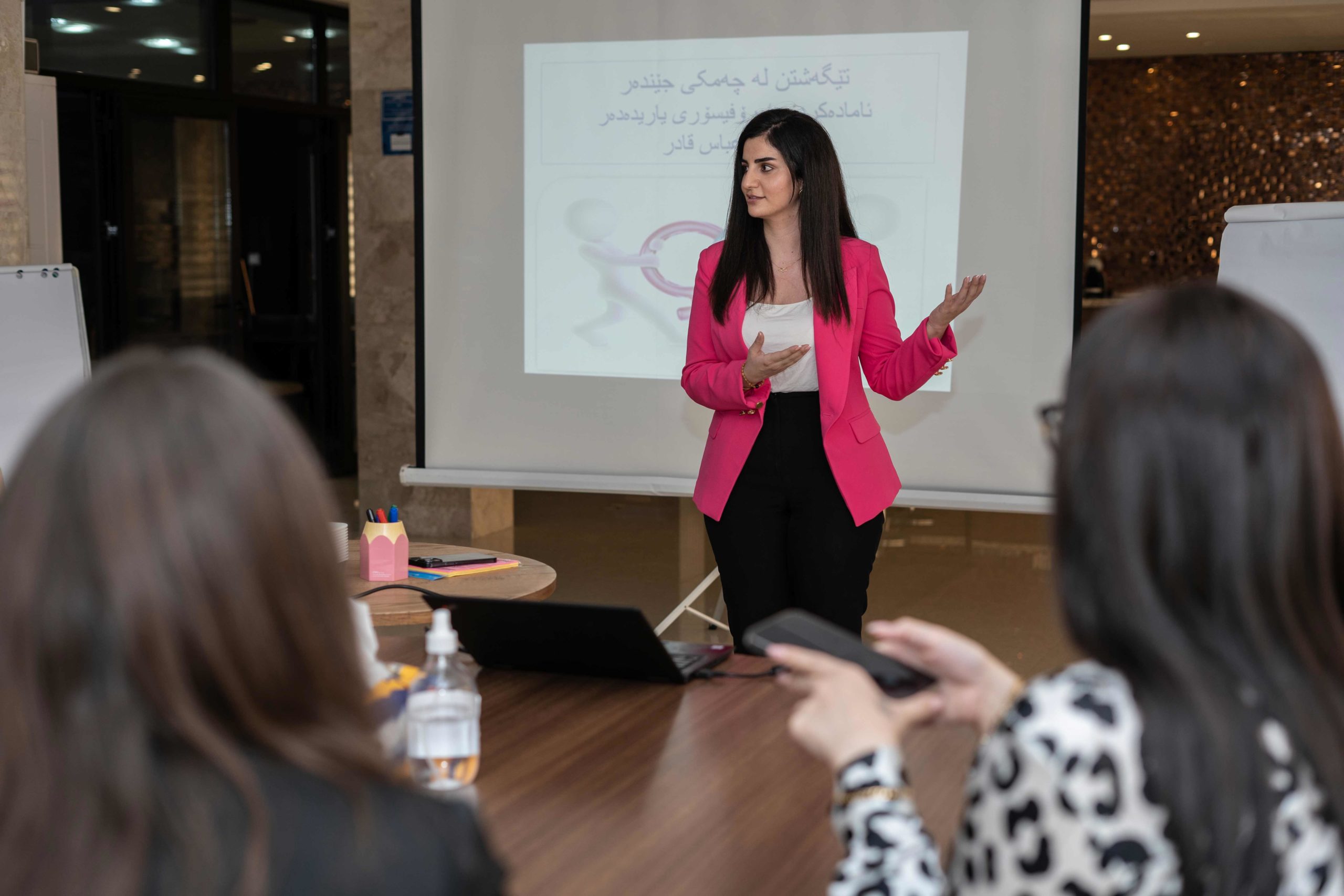
Jwana Abubakir
Every day, millions of clothing garments are discarded and sent to landfills. Fast fashion has created a culture of “disposable” clothing, resulting in accelerated manufacturing that produces close to 10% of all global carbon emissions each year. If this trend continues unabated, the cost to our environment could be devastating.
Jwana started her clothing upcycling project, Nwe Conic, two years ago. Jwana receives donations of old clothes which she then reuses and recycles to create new garments. She also incorporates everyday materials into her designs.
Her project aims to help protect the environment by reusing materials and reducing textile waste. This project offers a new way of creating fashion that is innovative, unique, and authentic. Jwana’s message is to inspire others not to throw away their old clothing, but to reuse materials creatively instead of spending money on new clothes.
“It is time for all of us to unite our efforts and work together, both sexes, without prejudice and discrimination. The earth is waiting for us to save it.”
جوانە أبوبکر
هەموو رۆژ ملیۆنان پارچە جلوبەرگ فڕێدەدرێت و دەبێت بە خاشاک. بەرهەمهێنانی جلوبەرگ بە شێوەیەکی خێرا وای کردووە کەلتووری فڕێدانی جلوبەرگ بێتە ئاراوە، کە ئەمەش بۆتە هۆکاری دەردانی ١٠٪ی گازی کاربۆن هەموو ساڵێک. ئەگەر ئەم دیاردەیە بەردەوام بێت، کارەساتی ژینگەیی لێ دەکەوێتەوە.
جوانە دوو ساڵ لەمەوبەر پڕۆژەکەی دەست پێکرد بەناوی (نوێ کۆنیک). جوانە جلوبەرگی بەکارهاتوو وەردەگرێت و دووبارە بەکاریان دێنێتەوە بۆ دروستکردنی بەرهەمی نوێ. هەروەها کەرەستەی رۆژانەش تێکەڵی دیزاینەکانی دەکات.
ئامانجی پرۆژەکەی پاراستنی ژینگەیە لەڕێگەی دووبارە بەکارهێنانەوەی کەرەستە و کەمکردنەوەی فڕێدانی جلوبەرگ. ئەم پڕۆژەیە شێوازێکی نوێی سەردەمیی و بێوێنە و رەسەن پێشکەش دەکات بۆ دروستکردنی جلوبەرگ. پەیامی جوانە هاندانی کەسانی دیکەیە جلوبەرگ فڕێ نەدەن بەڵکو بەشێوەیەکی داهێنەرانە بەکاری بهێننەوە لەباتی کڕینی جلوبەرگی نوێ.
“کاتی ئەوە هاتووە هەوڵەکانمان یەکبخەین و پێکەوە کار بکەین، هەمووان بێ جیاوازیی و جیاکاری. هەسارەکەمان پێویستی پێمانە.”
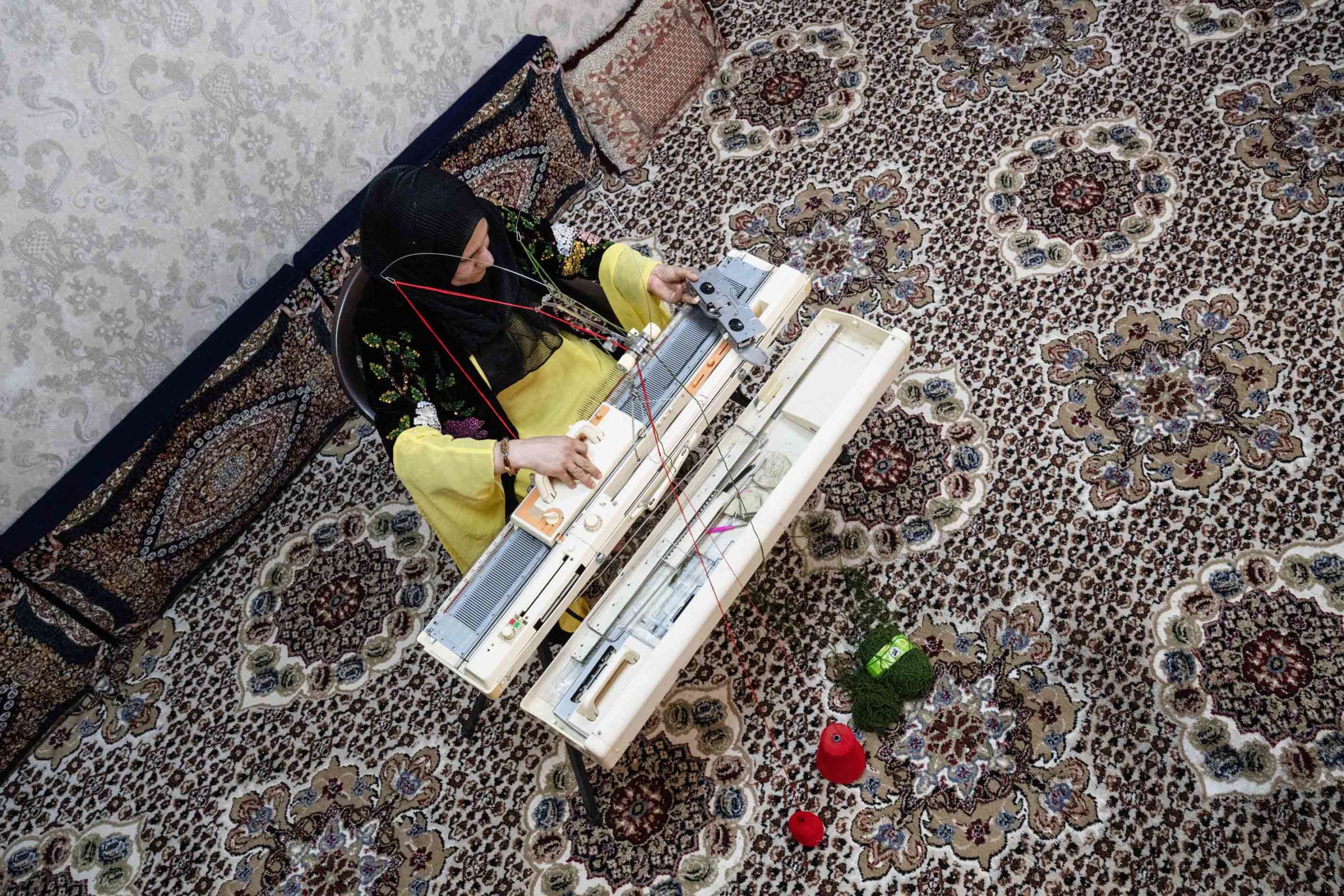
Jwan Yaseen Mohammad
Klash, or Kurdish shoes, are a symbol of Kurdistan worn traditionally with jli kurdi, and weaving them a historic pastime for artisans from across the region. The craftspeople tend to be men, with skills handed down from father to son, generation to generation.
But Jwan, a tailor who crafts the upper part of the Klash by hand and using knitting machines, stands passionately as a woman tailor. Jwan is very proud of her work. Alongside the financial independence her practice provides, the satisfaction and trust of her customers due to the beauty and quality of her products gives Jwan great contentment and love for her job. She wishes to expand her business in the future.
“Women in Kurdistan society must use their abilities to carry out their daily lives in the face of adversity, fearlessly and courageously. I believe that any woman can achieve whatever goal she sets for herself. I strongly believe that women should work outside the home to gain skills and experience while respecting our society’s traditions. Work and societal service are complementary to one’s faith and beliefs.”
جوان یاسین محمد
کڵاش کە پێڵاوێکی کوردییە و لەگەڵ جلوبەرگی کوردیدا لە پێ دەکرێت، و چنینی کڵاش ئارەزوویەکی مێژوویی بووە بۆ پێشەگەرانی کوردستان. زۆرینەی پیشەگەرەکان پیاونن کە لە باب و باپیرانەوە بۆیان ماوەتەوە.
بەڵام (جوان)، بەرگدروویەکە کە بەشی سەرەوەی کڵاش بە دەست و بە مەکینە دەچنێت، و خۆی وەک بەرگدروویەکی ژن چەسپاندووە. (جوان) زۆر سەربەرزە بە کارەکانی. جگە لە سەربەخۆیی دارایی ئەم کارەی، رەزامەندی و متمانەی کڕیارەکانی بەهۆی جوانی و کواڵیتی بەرهەمەکانی دڵنەواییەکی مەزن و خۆشەویستی بۆ پیشەکەی دەدات بە (جوان). حەز دەکات کارەکانی گەورەتر بکات لە داهاتوودا.
“پێویستە ژنان لە کوردستان بێ ترس و ئازایانە تواناکانی خۆیان بخەنەگەڕ بۆ ژیانی رۆژانەیان و رووبەڕووی ناخۆشییەکانی ژیان ببنەوە. پێموایە هەموو ژنێک دەتوانێت بە ئاواتەکانی خۆی بگات. باوەڕێکی بەهێزم هەیە کە دەبێت ژن لە دەرەوەی ماڵەوە کار بکات بۆ بەدەستهێنانی کارامەیی و ئەزموون بە رەچاوکردن و رێزگرتنی نەریتی کۆمەڵایەتی. کارکردن و خزمەتگوزاری کۆمەڵایەتی تەواوکەری بیروباوەڕی تاکەکانن.”
Renas Mohammad Abu Bakir
Around the world, horses are a symbol of strength, grace, and resilience, historically known for their role in battle: overcoming obstacles to carry their passengers to victory.
For Koshyar and Renas, their passion for horseback riding began as a hobby, but soon became a path to success. Together, they started an Instagram account under the handle KO-NAS, a combination of their given names. They aimed to spread awareness and information about horses and equestrianism, and to spread the joy and benefits of horseback riding across the region. They visited equestrian centers in Kurdistan and created informative content to motivate people to help build a stronger culture of horseback riding. They also posted instruction videos on YouTube.
Soon, their equestrian adventures expanded into selling merchandise and equipment. KO-NAS developed a mixture of natural herbs that protects horses from flies and pests during the summer. The mixture is locally produced and is an affordable substitute for expensive imported pesticides. Now, Koshyar and Renas have ambitious plans to open – not their first, but their second – equestrian field near Sulaimani.
“Women should strive to realize their full potential and make a visible impact in all fields. We, as KO-NAS, have demonstrated that women who believe in themselves and strive for their goals can reach the pinnacle of success by choosing their own lifestyle. Every successful woman should inspire another woman. When we support one another, we are stronger.”
رێناس محمد أبو بکر
ئەسپ لە هەموو جیهان نیشانەی هێز و جوانی و خۆڕاگرییە، و لە مێژوودا ناسراوە بە رۆڵی لە جەنگدا: زاڵبوون بەسەر بەربەستەکان بۆ بردنی سوارچاکان بەرەو سەرکەوتن.
لای کۆشیار و رێناس، حەزی سوارچاکیی وەک ئارەزوویەک دەستی پێکرد، بەڵام زوو بووە رێگایەک بۆ سەرکەوتن. پێکەوە هەژمارێکیان لەسەر ئینستەگرام کردەوە لەژێر ناوی (کۆناس) درووستکرد – کە لێکدانی ناوی هەردووکیانە. ئامانجیان بڵاوکردنەوەی زانیاری و هوشیاری بوو لەبارەی ئەسپ و سوارچاکییەوە و هاوبەشکردنی خۆشی و سوودی سوارچاکیی لە هەرێمی کوردستان. سەردانی ناوەندەکانی سوارچاکییان لە کوردستان کرد و ناوەڕۆکی داهێنەرانەیان دروستکرد بۆ هاندانی خەڵکی هاوکار بن لە بنیاتنانی کەلتوورێکی بەهێزتری سوارچاکیی. هەروەها ڤیدیۆی رێنماییان لەسەر یوتیوب بڵاوکردەوە.
هەرزوو سەرسەختییەکانی سوارچاکییان گەورە بوو و رووی لە فرۆشتنی کاڵا و کەرەستە کرد. کۆناس تێکەڵەیەکی گیای سرووشتی پەرەپێدا کە لە وەرزی هاویندا ئەسپ دەپارێزێت لە مێش و مەگەز. تێکەڵەکە بەرهەمێکی ناوخۆییە و جێگرەوەیەکی هەرزانە بە بەراورد لەگەڵ بەرهەمی هاوردەکراو. ئێستاش کۆشیار و رێناس پلانی کردنەوەی گۆڕەپانی سوارچاکییان هەیە لە نزیکی سلێمانی – کە ئەمەش دووەم گۆڕەپانیانە.
“پێویستە ژن کۆشش بکات و تواناکانیان بەگەڕ بخەن و کاریگەری بنیراو لە هەموو بوارەکاندا بێننە ئاراوە. ئێمە لە کۆناس نیشانمانداوە کە ئەو ژنانەی باوەڕیان بە خۆیانە و کۆشش دەکەن بۆ گەیشتن بە ئامانجەکانیان دەتوانن سەرکەوتن بەدەست بێنن لەڕێگەی هەڵبژاردنی شێوازی ژیانی خۆیان. پێویستە هەموو ژنێکی سەرکەوتوو ببێتە مایەی سروش بۆ ژنانی دیکە. کاتێک پاڵپشتی یەک دەکەین، بەهێزتر دەبین.”
Rozhin Khasraw
Honey from the Kurdistan Region has won many international awards. From the estimated 350,000 beehives and 10,000 beekeepers in the region, and from the high mountains of Sakran to the low-lying plains of Ninewa and Duhok, honey has played an important role in the region’s past and its prosperity. Only a few beekeepers are women, hindered by social stigma, but secretly wielding great skills in apiculture.
Rozhin is the first female beekeeper in Halabja. She has been working for more than three years, expanding an initial thirty boxes of bees to more than seventy. Living in the heart of Kurdistan’s pomegranate country, an area known for its rich and delicious fruits, nuts and oils, Rozhin is able to send her bees to feast on sweet nectar and establish herself as a serious apiarist among her overwhelmingly male associates.
“Although it was difficult to work in the beginning – from being bitten by bees because of my lack of skills, to the obstacles that came up in our society – I did not give up. Finally, with the help of my brothers and relatives, I was able to get through it all, and now I have my own project.”
رۆژین خەسرەو
هەنگوینی هەرێمی کوردستان زۆر خەڵاتی جیهانیی بەدەست هێناوە. لە نزیکەی (٣٥٠) هەزار شانە هەنگ و (١٠) هەزار مێشەوان لە هەرێم، و لە چیا بڵندەکانی سەکرانەوە بۆ دەشتاییەکانی نەینەوا و دهۆک، هەنگوین رۆڵێکی گرنگی بینیوە لە ئاوەدانی رابردوو و ئێستای هەرێم. تەنها چەند مێشەوانێک لەوانە ژنن کە بە دزییەوە مێشەوانیی دەکەن، بەهۆی پەڵەی کۆمەڵایەتی، و شارەزاییەکی باشیان لێ پەیدا کردووە.
رۆژین یەکەم مێشەوانی ژنە لە هەڵەبجە. زیاتر لە سێ ساڵە کار دەکات و توانیوەتی مێشەکانی لە (٣٠) شانەوە بۆ زیاتر لە (٧٠) شانە زیاد بکات. رۆژین کە لە ناو جەرگەی ناوچەی هەنار لە کوردستان دەژیت، کە ناوچەیەکی ناسراو و دەوڵەمەندە بە مێوە و گوێز و رۆنی بەچێژ، دەتوانێت مێشەکانی بەردات و لە گۆڵی ئەو دارانە بخۆن، و توانیوەتی جێگای خۆی لە نێوان مێشەوانی دیکە بکاتەوە.
“هەرچەندە لە سەرەتادا کارکردن ئەستەم بوو – هەر لە پێوەدانی میشەکانەوە بەهۆی ناشارەزاییەوە بگرە تا ئەو بەربەستانەی کۆمەڵگە دەیخاتە بەردەمت – بەڵام کۆڵم نەدا. لەکۆتاییدا، و بە یارمەتی برا و کەسوکارم، توانیم بەسەر هەموو بەربەستەکاندا زاڵ بم و ببمە خاوەن پڕۆژەی خۆم.”

Hamida Jamal Mohammad
Halabja is a city that evokes great sorrow. Memories of the Anfal Campaign and the horrific assault on innocent Kurds using chemical weapons are, for many, still raw. But in more recent history, the city has become synonymous with women’s leadership. Women now hold many top-level provincial roles in government, academia, and society.
Hamida has also “taken the wheel” in her role as a community leader and driving instructor at Shinirwe driving agency. She is very passionate about her job and believes that she is serving underprivileged women in Halabja by teaching them an essential life skill that helps them on their road to independence. She hopes, one day, to open an independent driving agency for women.
“Women should demonstrate their own high moral individuality to society through vibrant education, creative thoughts, and innovative ideas. This can give women professional authenticity and helps determine one’s value in society. As a proud, feminine woman, I will serve women for as long as I am capable.”
حمیدة جمال محمد
هەڵەبجە شارێکە کە نەهامەتییەکی مەزنمان دێنێتەوە یاد. یادەوەرییەکانی ئەنفال و کیمابارانی سەر کوردان برینێکە بۆ زۆر کەس کە هێشتا ساڕێژ نەبۆتەوە. بەڵام بەم دواییانە، شارەکە بۆتە هێمایەک بۆ پێشڕەویی ژنان. ئێستا ژنان رۆڵی زۆر بەرز دەبینن لە حکومەت و ژیانی ئەکادیمی و لە کۆمەڵگادا.
(حمیدة)ش وەک رابەرێکی کۆمەڵایەتی رۆڵی خۆی دەبینێت و لە دەزگای لێخوڕینی (شنروێ) خەڵکی فێری لێخوڕینی ئۆتۆمبێل دەکات. زۆر بەجۆشە بۆ کارەکەی و باوەڕی وایە خزمەتی ژنی کەمدەرامەت دەکات لە هەڵەبجە لەڕێگەی فێرکاری شارەزاییەکی گرنگ کە هاوکاریان دەبێت لەڕێگەی سەربەخۆیی. هیوادارە رۆژێک لە رۆژان دەزگایەکی لیخوڕینی سەربخۆ بکاتەوە بۆ ژنان.
“پێویستە ژنان کەسایەتی بەرزی خۆیان لە کۆمەڵگا نیشان بدەن لەڕێگەی پەروەردە و بۆچوون و بیرۆکەی داهێنەرانەوە. ئەمە دەتوانێت رەسەنایەتی پیشەیی بە ژنان بدات و یارمەتیدەر بێت لە دەستنیشانکردنی بەها خودییەکان لە کۆمەڵگادا. وەک ژنێکی سەربەرز بەردەوام دەبم لە خزمەتکردنی ژنان تا بتوانم.”
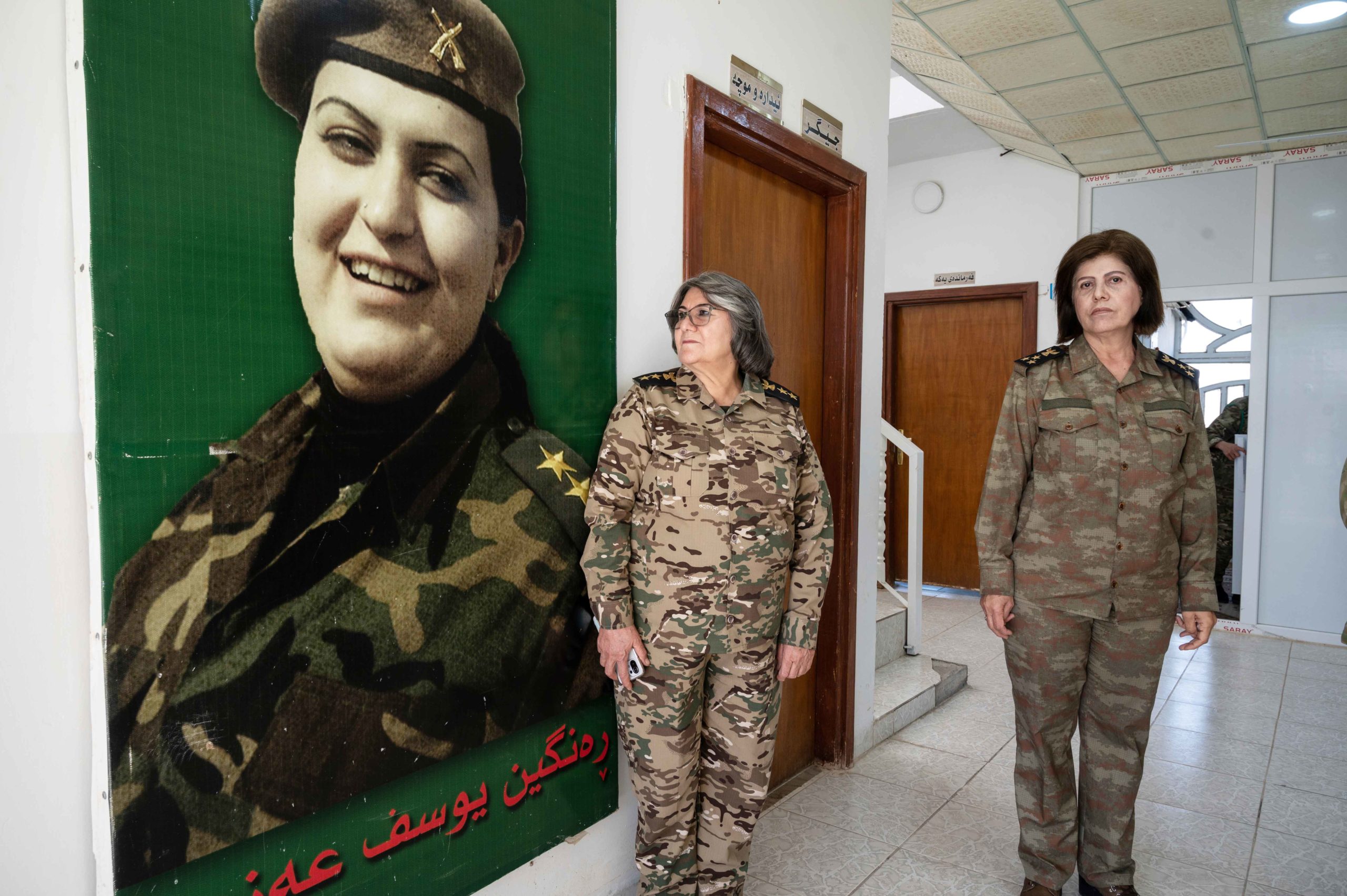
Nasrin Said Hamalaw
Peshmerga, which translates to “those who face death,” is the military force of the Kurdistan Region of Iraq. Their existence dates back to the mid-20th century, when the fight for Kurdish autonomy was ignited.
Nasrin played a critical role in establishing the first women’s regiment in the Peshmerga in 1996. She had already supported the Peshmerga since 1979, when her husband joined their ranks. Motivated by her love for Kurdistan and its liberty, Nasrin – who currently holds the rank of Colonel – hoped the women’s regiment would help to achieve freedom, equality, and social justice in the region, while also aiming to obtain and protect women’s rights, and promote women’s achievements throughout Kurdistan’s history.
“Kurdish society’s progress in all fields has not been achieved by Kurdish men alone. Kurdish women have worked alongside men in all fields. It is the women who educate the next generation who will become a major force in defending our country in the future.”
نەسرین سعید حەمەلاو
پێشمەرگە، کە بە واتای رووبەڕووبوونەوەی مەرگ دێت، سوپای هەرێمی کوردستانە. پێشمەرگایەتی دەگەڕێتەوە بۆ ناوەڕاستی سەدەی ٢٠ کاتێک خەبات بۆ ئۆتۆنۆمی کوردستان دەستی پێکرد.
لە ساڵی ١٩٩٦، نەسرین رۆڵێکی گرنگی بینی لە دروستکردنی فەوجێکی ژنان لە نێو پێشمەرگەدا. هەر لە ساڵی ١٩٧٩ وە پاڵپشتی پێشمەرگەی کردبوو کاتێک هاوسەرەکەی چووە نێو رێزەکانییەوە. نەسرین کە خۆشەویستی بۆ کوردستان و سەربەخۆیی هانی دەدات – کە ئێستا پلەی (عەقید)ی هەیە – هیوای وایە کە فەوجی ژنان هاوکار بن لە بەدەستهێنانی ئازادی و یەکسانی و دادپەروەری کۆمەڵایەتی لە هەرێم، و هەروەها بەدەستهێنان و پاراستنی مافەکانی ژنان و برەودان بە دەستکەوتەکانی ژنان بەدرێژایی مێژوو.
“گەشەسەندنی کۆمەڵگەی کوردی لە هەموو بوارەکان تەنها لەلایەن پیاوانەوە نەبووە. ژنان شان بەشانی پیاوان کاریان کرد لە هەموو بوارەکاندا. ئەوە ژنە کە نەوەی داهاتوو پەروەردە دەکات کە دەبنە هێزی سەرەکی بەرگریکردن لە وڵاتەکەمان لە داهاتوودا.”
Hawzhin Mohammad Rasool
Villages and towns scattered along the Iran-Iraq border have faced many decades of unrest. Frequent bombings – which often result in death – keep villagers in a state of fear and vigilance, but many have nowhere else to go. These are their homes.
For Hawzhin, a teacher and social activist, these assaults have emboldened her to educate herself, help others, and raise awareness among women in her village on their rights and the causes of violence. Hawzhin regularly attends international and local conferences on women’s rights and violence prevention, and takes this information back to her students in the village.
Every Friday, she organizes talks and social gatherings to educate women about violence, their duties in prevention, and their human rights. No woman has been killed or burned alive in her village for several years.
هاوژین محمد رسول
لادێ و شارۆچکەکانی سەر سنووری عێڕاق و ئێران رووبەڕووی دەیان ساڵی ناسەقامگیری بوونە. بۆمبارانکردنی بەردەوام – کە زۆرجار مردنی لێ دەکەوێتەوە – وای کردووە دانیشتووانی لادێکان هەمیشە لە ترس و دڵەڕاوکێدا بژین، بەڵام زۆربەیان هیچ جێگەیەکی دیکەیان نییە بۆی بڕۆن. ئەوە ماڵ و حاڵی ئەوانە.
ئەم بۆردومانانە بۆ هاوژین، کە مامۆستا و چالاکوانێکی کۆمەڵایەتییە، هاندانێکە بۆ پەروەردەی خودیی و هاوکاری کەسانی دیکە و بڵاوکردنەوەی هوشیاری لەنێوان ژنانی لادێیەکی خۆی لەسەر مافەکانیان و هۆکارەکانی توندوتیژی. هاوژین بەردەوام ئامادەی کۆنفڕانسی نێودەوڵەتی و ناوخۆیی دەبێت لەسەر مافەکانی ژن و رێگریکردن لە توندوتیژی، و ئەم زانیارییانە دەباتەوە بۆ خوێندکارەکانی لە لادێ.
هەموو رۆژ کۆڕ و کۆبوونەوەی کۆمەڵایەتی رێکدەخات بۆ پەروەردەکردنی ژنان لەسەر توندوتیژی، ئەرکی سەر شانیان لە رێگریکردن، و هەروەها مافی مرۆڤ. ساڵانیکی زۆرە هیچ ژنێک نەکوژراوە و نەسوتێنراوە لە لادێکەی.
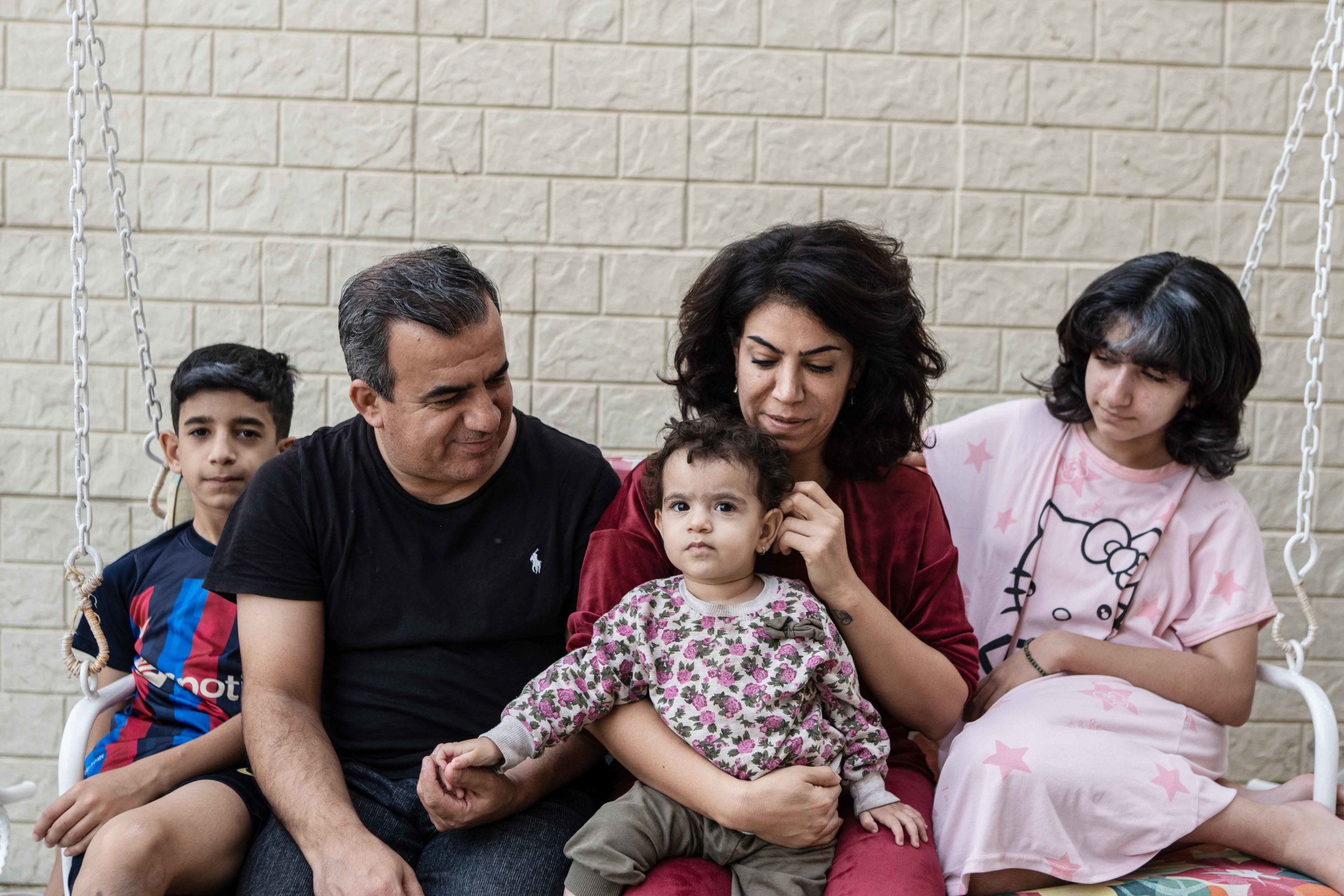
Rozha Hassan Salih
The first documented film from the Kurdistan Region was released in 1927. Since then, film has been used by many directors to bring attention to the plight of Kurdistan’s people, their struggle to overcome conflict and war, and the beauty in their culture and rich history.
Rozha Hassan Salih is a film director, producer, playwright, poet, cultural development trainer, and human rights activist with a focus on women’s issues in Kurdistan society. Children have also been a focus of her work, and she has written several plays for children’s theater, some of which received prizes from the Ministry of Culture. Her poetry and many of her other works are published on local websites and in magazines. Her films include “Hidden”, which deals with the problems facing children who have been sexually abused and who remain anonymous and stigmatized in society, “18-19”, “Yousuf”, and “The Fourth Mask”.
Rozha has been working in civil society organizations for 15 years and is currently the Director of Development Programs at a local NGO. She also founded and supervised the group “Woman can do it – Kurdistan” and, for 4 years, hosted the Radio program “Tanopo”, which focused on fundamental and social issues that women face on a daily basis across the region.
رۆژە حسن صالح
یەکەم فیلم کە لە هەرێمی کوردستانەوە دەرچوو ساڵی ١٩٢٧ بوو. لەو کاتەوە، فیلم لەلایەن زۆرێک دەرهێنەرەوە بەکار هاتووە بۆ تیشک خستنەسەر نەهامەتی گەلی کورد و کۆششکردنیان بۆ زاڵبوون بەسەر جەنگ و ململانێ و جوانیی کەلتوور و مێژووە دەوڵەمەندەکەی.
رۆژە حسن صالح دەرهێنەری فیلم و بەرهەمهێن و شانۆنووش و شاعیر و راهێنەری پەرەپێدانی کۆمەڵایەتی و چالاکوانی مافەکانی مرۆڤە کە سەرنجی زیاتر لەسەر کێشەکانی ژنانە لە کۆمەڵگەی کوردی. منداڵیش هەروەها جێگای سەرنج بوون لە کارەکانی، چەندەها شانۆگەری بۆ منداڵان نووسیوەتەوە، هەندێک لەو شانۆگەرییانە خەڵات کراون لەلایەن وەزارەتی رۆشنبیرییەوە. هۆزانەکانی و زۆرێک لە کارەکانی دیکەی لە ماڵپەڕ و گۆڤارە ناوخۆییەکان بڵاوکراونەتەوە. فیلمەکانی بریتین لە (شاراوە) کە مامەڵە لەگەڵ ئەو کێشانە دەکات کە رووبەڕووی منداڵان دەبێتەوە کە تووشی بەدمامەڵەی سێکسی بوون و وەک کەسانی نەناس و شەمەزار تەماشا دەکرێن لە کۆمەڵگا، و هەروەها (١٨-١٩)، (یوسف)، و (چوارەم دەمامک).
رۆژە بۆ ماوەی ١٥ ساڵ لە رێکخراوەکانی کۆمەڵگەی مەدەنی کاری کردووە و لە ئێستادا بەڕێوەبەری پەرەپێدانی پڕۆگرامە لە رێکخراوێکی ناحکومی ناوخۆیی. هەروەها دامەزرێنەر و سەرپەرشتیاری گروپی (ژنان دەتوانن – کوردستان) بووە و بۆ چوار ساڵ پڕۆگرامی (تانۆپۆ)ی رادیۆیی بەڕێوەبردووە، کە سەرنجی لەسەر کێشە سەرەکی و کۆمەڵایەتییەکان بوو کە رۆژانە رووبەڕووی ژنان دەبێتەوە لە هەرێم.
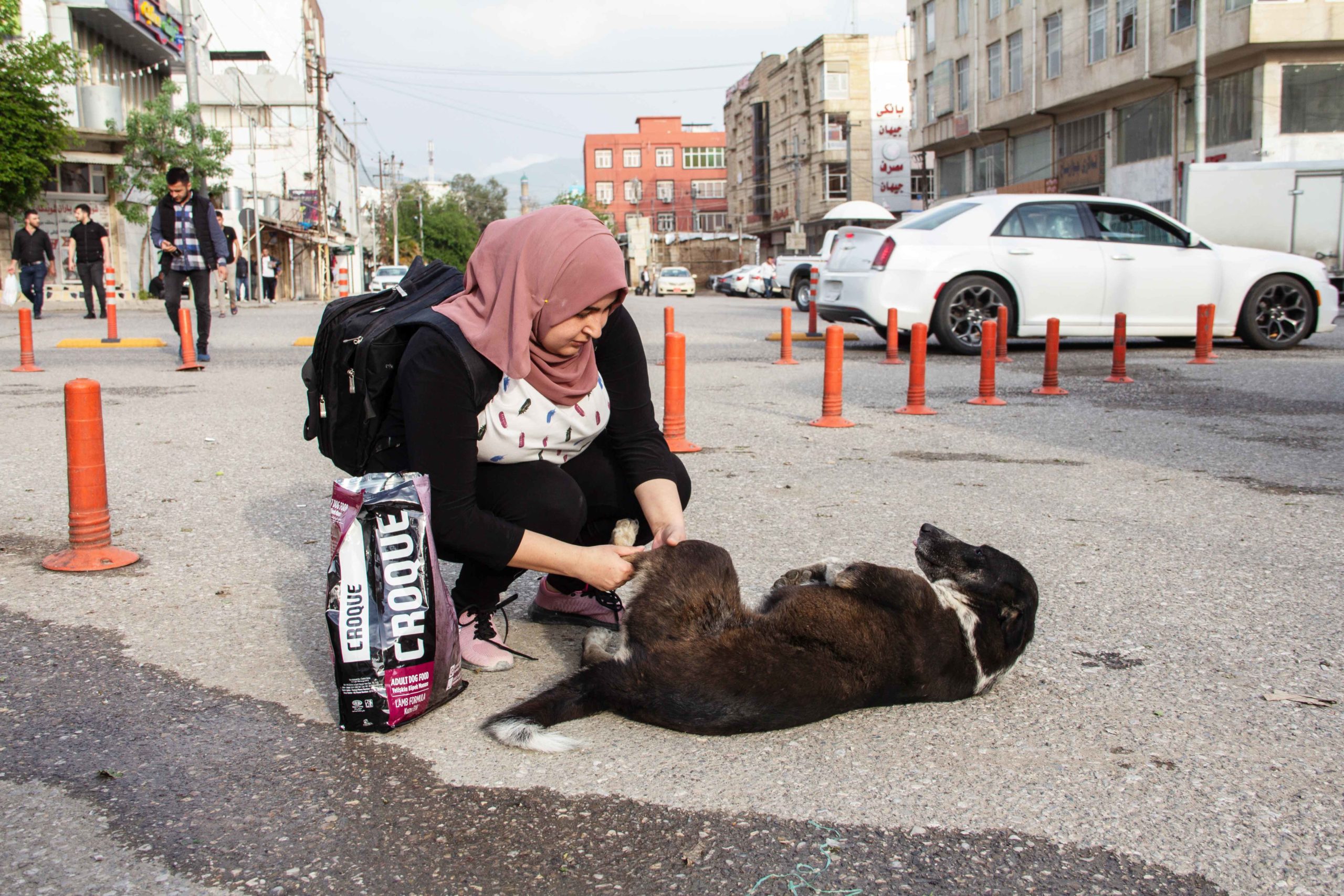
Laven Abdulwahab Ahmed
Kurdistan has a long history of welcome, hospitality, and compassion for others – including our animal friends. Thought to be the location where goats were first domesticated over 10,000 years ago, the region has a long history of animal agriculture, as well as rich biodiversity and wildlife. However, over the years, human relationships with cats and dogs have suffered, with growing stray animal populations encroaching on urban centers and small villages. Today, animal lovers have united to help humanely manage and reduce these animal populations, while educating the public on how to engage with them safely.
Laven is a veterinarian and animal activist. In 2018, she co-founded Pako Organization with a group of other animal lovers, with the goal of protecting the region’s animals. In addition to helping and treating animals, she has been successful in changing the attitude of thousands of people, who now show more compassion towards animals. Laven is currently pursuing a Master’s degree in Applied Animal Behavior and Welfare through a Chevening Scholarship in the United Kingdom.
“Always believe in yourself. Never say you can’t, because you’re human. Don’t limit your abilities to the word woman or female. You will be the one to change the pages of history.”
لاڤین عبدالواحد أحمد
کوردستان مێژوویەکی دوور و درێژی هەیە لە مێوان دۆستی و بەزەیی بۆ کەسانی دیکە، لە نێوانیاندا بەزەیی بە ئاژەڵ. دەوترێت کە کوردستان یەکەم شوێن بووە کە یەکەم جار بزن ماڵی کراوە نزیکەی (١٠) هەزار ساڵ لەمەوبەر، ناوچەکە مێژوویەکی درێژی هەیە لە ئاژەڵداری و ئاژەڵی کێوی. بەڵام ساڵانێکە پەیوەندی نێوان مرۆڤ و پشیلە و سەگدا باش نەبووە، کە ئەمەش وای کردووە ئاژەڵی بەڕەڵڵا زۆر بێت لە شار و شارۆچکەکان. ئەمڕۆ ئاژەڵ دۆستان یەکیان گرتووە بۆ ئەوەی بەشێوەیەکی مرۆڤانە ژمارەی ئەم ئاژەڵە بەرەڵڵایانە کەم بکەنەوە و هەروەها خەڵکی ئاشنا بکەن بە شێوازی سەلامەت بۆ مامەڵەکردن لەگەڵیان.
لاڤان، چالاکوان و پزیشکی ئاژەڵانە. لە ساڵی ٢٠١٨، لەگەڵ گروپێکی دیکەی ئاژەڵدۆستان رێکخراوی پاکۆیان دامەزراند بە ئامانجی پاراستنی ئاژەڵی هەرێمەکەمان. جگە لە یارمەتی و چارەسەرکردنی ئاژەڵ، لاڤان سەرکەوتوو بووە لە گۆڕینی هەڵسوکەوتی هەزاران کەس بەرامبەر بە ئاژەڵ، خەڵکی ئێستا بەزەییان زیاترە بەرامبەر بە ئاژەڵ. لە ئێستادا لاڤان خەریکی بڕوانامەی ماستەرە لەسەر چاودێری و رەفتاری ئاژەڵان لەڕێگەی سکۆلارشیپی شێڤنینگ لە شانشینی یەکگرتوو.
“هەمیشە باوەڕتان بە خۆتان بێت. هەرگیز مەڵێن ناتوانین چوونکە ئێوە مرۆڤن. تواناکانتان سنووردار مەکەن بە وشەی ژن یان ئافرەت. تۆی ئەو کەسەی پەڕەکانی مێژوو دەگۆڕیت.”
Ghamgin Ahmed
Karate is a fighting style developed in the late 19th and early 20th centuries by the Ryukyuan people, native to the islands located between Kyushu and Taiwan. Today, it’s a globally celebrated sport, played at the highest level: the Olympic games. But for some, like Ghamgin, it is also a means to boost self-confidence, and develop mental fortitude and resilience.
Ghamgin always had a strong interest in Karate. By the end of her freshman year, after 4 years of practice, she joined a Karate club. Demonstrating her talent and passion early on, she was presented with numerous opportunities to become an instructor, but preferred to remain a student and hone her craft.
Later, she decided to become a trainer and teach other women like her, who love this sport but are discouraged from pursuing it due to restrictive social norms and entrenched ideas of what women should and shouldn’t do. Ghamgin is one of the region’s female pioneers of this sport. She can detect other women’s eagerness to learn, which motivates her to be the best teacher she can. She says that they remind her of younger herself.
“Women in this region have not been given enough opportunity and space to be able to demonstrate their full potential and explore success through different experiences. Fortunately, I see the determination and hope in many women to achieve any goal they set for themselves.
Working women learn about teamwork, goal-setting skills, enjoy health benefits, experience high levels of self-confidence, and can effectively cope with life’s pressures, problems, and risks.”
غەمگین أحمد
کاراتێە شێوازێکی شەڕکردنە کە لە کۆتایی سەدەی ١٩ و سەرەتای سەدەی ٢٠ دا لە لایەن گەلی (ریوکیو)وە سەری هەڵدا، کە خەڵکی ئەو دوورگانەی نێوان (کیوشو) و (تایوان) ن. ئەمڕۆ ئەم یارییە وەک وەرزشێکی جیهانیی هەژمار دەکرێت و لەسەر ئاستە بڵندەکان یاری دەکرێت، وەک یارییە ئۆلۆمپییەکان. بەڵام بۆ هەندێک کەسی وەک غەمگین، ئامرازێکی بڵندکردنەوەی متمانەی خودیی و پەرە بە خۆڕاگری و جێگریی دەروونی دەدات.
غەمگین هەمیشە حەزی لە کاراتێە بوو. لە کۆتایی ساڵی یەکەمی زانکۆ و پاش چوار ساڵ مەشقکردن، بەشداری کرد لە یانەیەکی کاراتێە. هەر زوو لێهاتوویی و حەزی بۆ ئەم وەرزشە نیشاندا، و چەندەها دەرفەتی پێشکەشکرا بۆ ئەویە ببێت بە رێنماییکار، بەڵام پێی خۆش بوو وەک فێرخوازێک بمێنێتەوە.
پاشان بڕیاریدا ببێت بە راهێنەر و ژنانی وەک خۆی فێر بکات کە حەزیان بەم وەرزشە هەیە بەڵام بەهۆی نەریتی کۆمەڵایەتی و بیروبۆچوونەکان کە سەپێندراون لەسەر ژن نەیانتوانیوە بەشداربن. غەمگین یەکێکە لە ئافرەتە سەرکەوتووەکانی ئەم ورزشە لە کوردستان. ئەو دەتوانێت پەرۆشی ژنان بۆ فێربوون دیاریی بکات، کە ئەمەش هانی دەدات ببێت بە باشترین فێرکار. ئەو دەڵێت ئەوان خۆی بەبیری دێننەوە.
“لەم هەرێمە زۆر دەرفەت و مەودا بە ژن نەدراوە بۆ ئەوەی بتوانن تواناکانی خۆیان بەدەر بخەن و سەرکەوتن بەدەست بێنن لە زۆر بواردا. خۆشبەختانە سووربوون و ئاوات لە زۆر ژن دەبینم بۆ گەیشتن بە هەر خەونێک کە بۆ خۆیان داناوە. ئەو ژنانەی کار دەکەن فێری کاری پێکەوەیی و کارامەیی دانانی ئامانج دەبن، چێژ لە سوودمەندی تەندروستی دەبینن، ئاستی بەرزی متمانەی خودیی ئەزموون دەکەن، و دەتوانن خۆیان لەگەڵ فشار و کێشە و مەترسییەکانی ژیان بگونجێنن.”
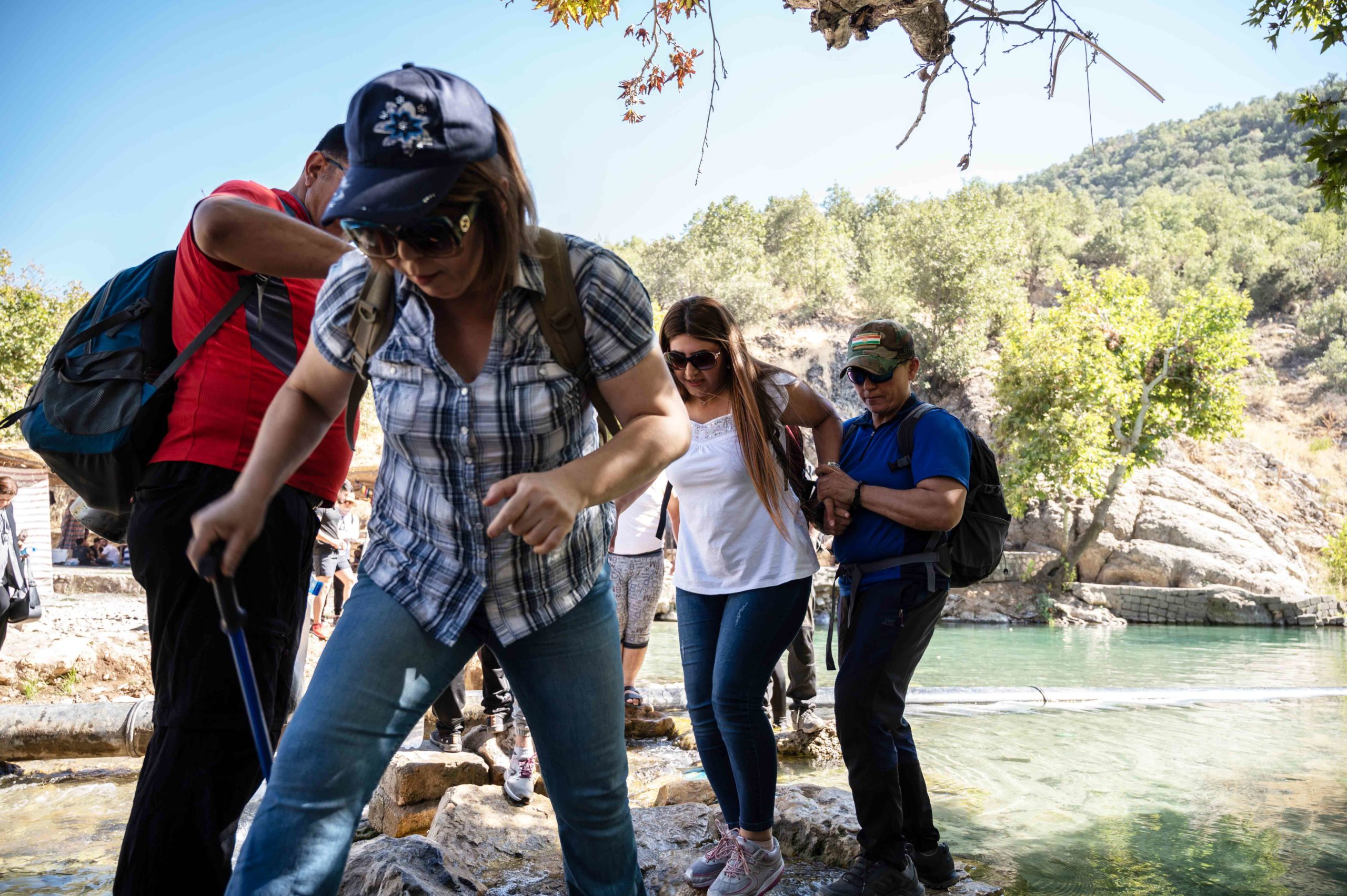
Paiman Taha
No friends but the mountains. A Kurdish proverb that simultaneously expresses the Kurdistan people’s love for their great protectors and signifies their loneliness after centuries of betrayal and abandonment. Today, for many people living in Kurdistan, the mountains not only provide an escape from reality, a relaxing and calm space for reflection, but also an opportunity to highlight the incredible nature that the region offers to locals and tourists alike.
Paiman founded Hazarmerd Hiking Club in 2015. She is the head and organizer of the club, guiding people of all ages and backgrounds through hiking excursions in Kurdistan’s mountains and nature. Paiman has a deep passion for working out and sports.
“In the beginning, we were a small group of women. But then, I started encouraging women in my neighborhood to engage in sports, whether swimming, climbing, or aerobics. We developed step by step and continued to encourage other women to join us on our hikes.”
پەیمان طە
تەنها چیاکان هاوڕێی کوردن. ئەمە پەندێکە کە دەستبەجێ گوزارشت لە حەزی کورد دەکات بۆ چیاکان کە کوردیان پاراستووە و تەنهایی کورد سەدە لە دوای سەدەی خیانەت و وەلاوەنان دەردەبڕێت. بۆ زۆرێک خەڵک لە کوردستانی ئەمڕۆدا، چیاکان نەک تەنها شوێنێکن بۆ هەڵاتن لە جەنجاڵی شار و شوێنێکی ئارامن بۆ رامانین، بەڵکو دەرفەتێکیشن بۆ تیشک خستنەسەر سروشتی جوانی ناوچەکە بۆ کورد و گەشیاران پێکەوە.
پەیمان لە ساڵی ٢٠١٥ یانەی شاخەوانی هەزارمێردی دامەزراند. ئەو سەرۆک و رێکخەری یانەکەیە، رێبەری بۆ خەڵکی لە هەموو تەمەن و باکگراوندێک دەکات لە گەشتی شاخڕەوی لە چیاکانی کوردستان. پەیمان ئارەزوویەکی زۆری هەیە بۆ وەرزش و مەشقکردن.
“لە سەرەتادا کۆمەڵێکی بچووکی ژن بووین، بەڵام پاشان دەستم کرد بە هاندانی ژن لە گەڕەکەکەمان بۆ ئەوەی وەرزش بکەن، جا چ مەلەکردن و بەردەوانی بێت یان یاری هەوایی. هەنگاو بە هەنگاو پێشکەوتین و بەردەوام بووین لە هاندانی ژنی دیکە بۆ بەشداریکردن لە شاخڕەوییەکانمان.”
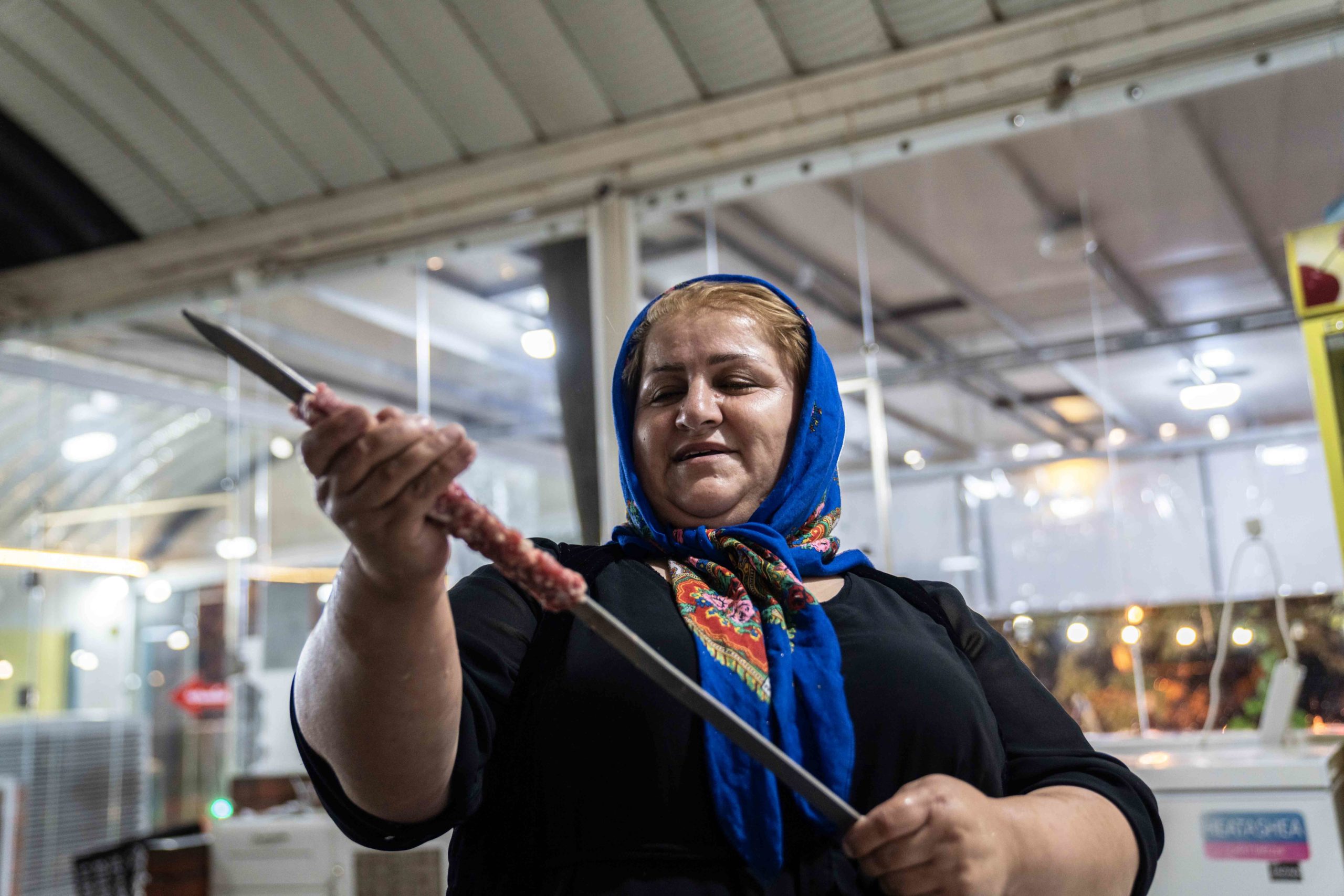
Runak Faraj
While it is no longer groundbreaking to find a woman supporting her family financially in Kurdistan, it is still not common. As of 2018, only 15% of women in the Kurdistan Region were in the workforce, compared to 70% of men. Even fewer women own businesses. But times are changing, and whether out of necessity, passion, or talent, more and more women in Kurdistan are establishing themselves as formidable and resourceful business people.
Runak owns and runs two branches of a restaurant in her village. She opened the restaurant’s first branch in Kharpany in 2012 and has been financially independent since. Runak is very passionate about her work and loves running her restaurants.
“I have a clear conscience since I do not betray my customers, employees, or anyone. I want to encourage every woman in the region to go out and work to be financially independent.”
روناک فرج
هەرچەندە لە کوردستان چی دی شتێکی نوێ نییە کە ژن پاڵپشتی دارایی خێزانی خۆی بکات، بەڵام هێشتا زۆر باو نییە. لە ساڵی ٢٠١٨، تەنها ١٥٪ی ژنان لە هەرێمی کوردستان کاریان دەکرد بە بەراورد لەگەڵ پیاوان کە ٧٠٪بوو. تەنانەت چەند ژنێک لەو ئامارە خاوەن کاری خۆیانن. بەڵام کات بەرەو گۆڕانکارییە و چ بە هۆی پێویستیی یان خولیا یان بەهرەوە بێت، ژمارەیەکی زۆری ژنان لە کوردستان خۆیان وەک خاوەن کاری سەرکەوتوو نیشان دەدەن.
روناک دوو لقی چێشتخانە لە لادێیەکەی خۆی بەڕێوە دەبات. یەکەم لقی چێشتخانەکەی لە ساڵی ٢٠١٢ لە (خەرپانی) کردەوە و لەو کاتەوە سەربەخۆیی دارایی خۆی بەدەست هێناوە. ئەو کارەکەی خۆی و بەڕێوەبردنی زۆر خۆش دەوێت.
“ویژدانم ئاسوودەیە لەبەر ئەوەی خیانەت لە کڕیار و کارمەند و کەس ناکەم. دەمەوێت هانی هەموو ژنێک بدەم لە هەرێمی کوردستان بچنە دەرەوە و کار بکەن بۆ ئەوەی سەربەخۆیی دارایی بەدەست بێنن.”
Bana Shirwan
Music is central to the many cultures present in the Kurdistan Region. Rooted in tradition, but constantly morphing and adapting to modern styles and techniques, many notable musicians performing today meld the folk music of centuries past with popular genres: pop, trap, R’n’B, and rock.
Bana is one of these young musicians – inspired by traditional Kurdish songs, but adapting them to mainstream pop to appeal to younger and wider audiences, including outside Kurdistan.
Entering the music business at a young age, Bana has worked hard to write songs that reflect her own experience as a woman in Kurdistan, rather than sticking to established formulas. When not working on new tracks in the studio, Bana is a student at the American University of Iraq – Sulaimani, where she is studying business management. She chose this major so she could rely on herself to make sound business decisions and steer her career in the direction she desires. She plans to release an album of new English-language songs in 2023.
“A lot of girls can’t be themselves in Kurdistan, but you can find the balance. You should never give up and always get back up again.You can do it all. Do it all with passion and love.”
بانە شێروان
مۆسیقا لە چەقی هەموو کەلتوورێکی هەرێمی کوردستانە. رەگی لە نەریتدا چەسپاندووە بەڵام بەردەوام خۆی لەگەڵ تەکنیک و شێوازی مۆدێرن گونجاندووە، زۆرێک لە میوزیکژەنەکانی ئەمڕۆ ئاوازی فۆلکلۆریی سەدان ساڵە تێکەڵ بە مۆسیقای باوی وەک: پۆپ، (R’n’B)، و رۆک دەکەن.
بانە یەکێکە لەم میوزکژنە گەنجانە – کە حەزی بە گۆرانی فۆلکلۆری کوردییە، بەڵام دەیانگونجێنێت لەگەڵ مۆسیقای پۆپ بۆ ئەوەی گەنجان و جەماوەری زیاتر گوێی لێ بگرن، لە دەرەوەی کوردستانیش.
بانە کە لە تەمەنێکی بچووکەوە هاتە نێو کاری مۆسیقاوە، زۆر ماندوو بوو لە نوسینەوەی گۆرانی کە رەنگدانەوەی ئەزموونی خۆیەتی وەک ژن لە کوردستان، نەک لەسەر ئاوازی کۆن بمێنێتەوە. کاتێک خەریکی گۆرانی نوێ نییە لە ستۆدیۆ، بانە خوێندکارە لە زانکۆی ئەمریکی عێڕاق/ سلێمانی و خەرێکی خوێندنی کارگێڕی کارە. ئەم بوارەی لەبەر ئەوە هەڵبژاردووە تاکو بتوانێت پشت بەخۆی ببەستێت لەبڕیاردان و ژیانی کاری خۆی بەو ئاڕاستەیە ببات کە خۆی حەزی لێ دەکات. پلانی هەیە ئەلبوومێکی گۆرانی بەزمانی ئینگلیزی لەساڵی ٢٠٢٣ بڵاوبکاتەوە.
“زۆرێک کچان لە کوردستان ناتوانن ببن بەو کەسەی خۆیان دەیانەوێت. نابێت هەرگیز کۆڵ بدەن و دەبێت هەمیشە هەڵبسنەوە سەر پێ. دەتوانن سەربکەون، بە خۆشەویستی و ئارەزووەوە ئەنجامی بدەن.”
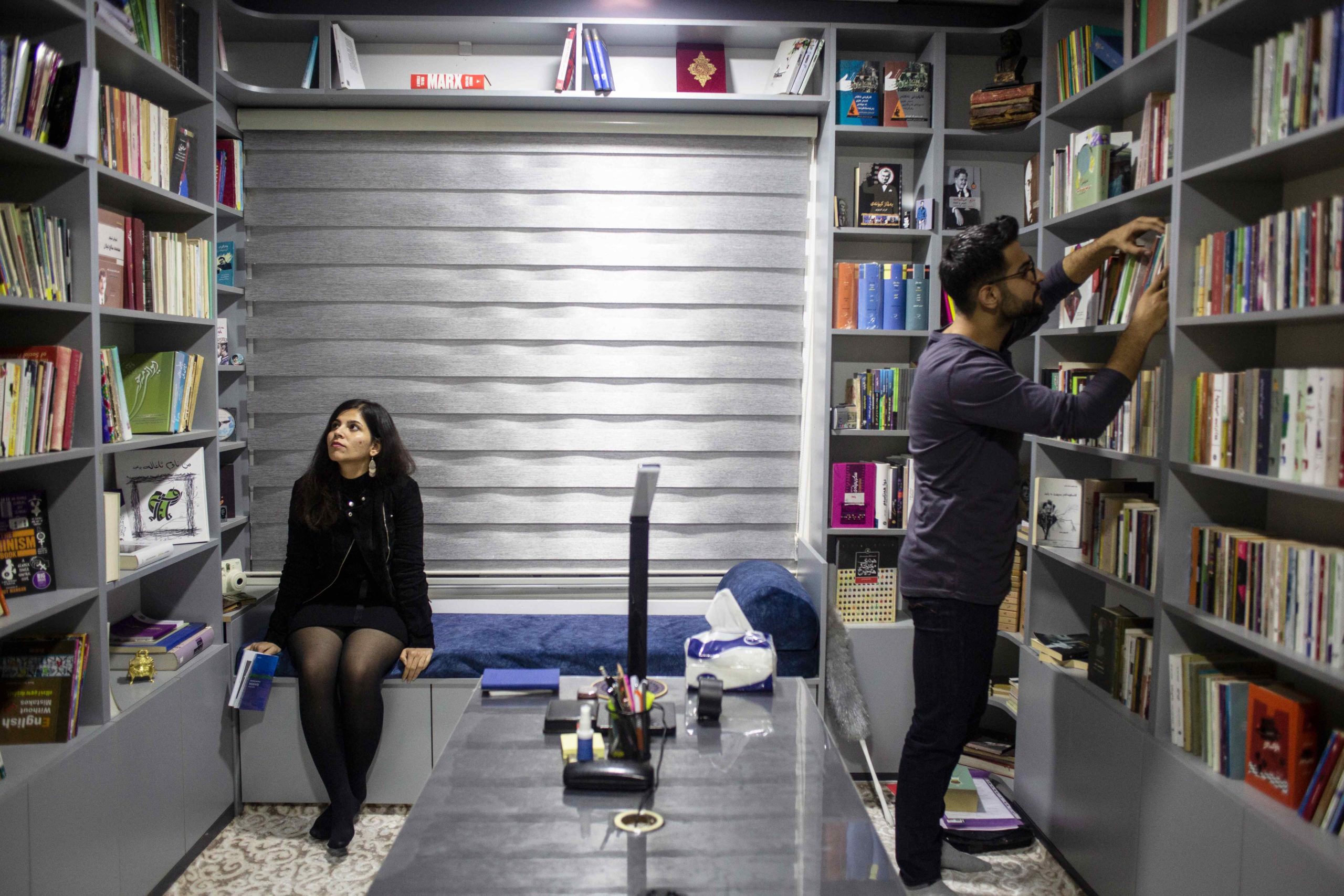
Savan Abdulrahman Ahmed
Women have historically faced difficulties accessing education around the globe. In Iraq and Kurdistan, more and more women are utilizing education as a gateway to cultural expression and normative change – helping craft a more inclusive narrative for the future, despite continuing inequalities in access and mobility, particularly for women living in rural communities. With more women setting the example for what can be achieved through education – not only for themselves, but for their families and communities – the tide is turning for women who choose to pursue higher education and research.
Savan is a research assistant on an LSE Research project about the Roots of Masculinity, as well as the editor-in-chief at DidiMn, a Kurdish cultural website, and the founder of Tema Group, an initiative dedicated to education and research. Additionally, Savan has enjoyed significant success as a literary translator, translating Piramerd’s selected prose and poetry, as well as having many translated works published on different platforms.
“We were taught not to dream big, and sometimes not to dream at all! Now here we are, dreaming big, making an effort to make them come true, and overcoming the struggles. Sometimes we climb, sometimes we crawl, and sometimes we fail, but that’s all right as long as we stand up again and dream even bigger.”
ساڤان عبدالرحمن أحمد
بە درێژایی مێژوو ژن رووبەڕووی ئاستەنگ بۆتەوە لە تەواوکردنی خوێندن. لە کوردستان و لە عێڕاق، ژمارەیەکی زۆری ژن خوێندن بەکار دێنن وەک کەناڵێک بۆ دەربڕینی کەلتووریی و گۆڕانکاری یاسایی – هاوکارن لە داڕشتنەوەی گێڕانەوەیەکی گشتگیر بۆ داهاتوو سەرەڕای نایەکسانی بەردەوام لە دەستڕاگەیشتن و جووڵەکردندا، بە تایبەت بۆ ئەو ژنانەی لە کۆمەڵگە دوورەدەستەکان ژیان بەسەر دەبەن. لەگەڵ بەرزبوونەوەی ژمارەی ئەو ژنانەی دەبن بە نموونە بۆ ئەوەی کە دەکرێت لەڕێگەی خوێندنەوە بەدەست بێت – نەک تەنها بۆ خودی ژنەکە، بەڵکو بۆ کەسوکار و کۆمەڵگەکەشی – تای تەرازووەکە بەلای ئەو ژنانەدایە کە بەلای تەواوکردنی خوێندنی باڵا و توێژینەوەدا دەڕۆن.
ساڤان توێژەری یاریدەدەرە لەسەر پرۆژەی توێژینەوەی (LSE) دەربارەی رەگەکانی پیاوسالاریی، و سەرنووسە لە (دیدی من) کە ماڵپەڕێکی کەلتووریی کوردییە، و هەروەها دامەزرێنەری گروپی (تێما)یە، کە دەستپێشخەرییەکە تایبەت بە خوێندن و توێژینەوە. جگە لەمانە، ساڤان سەرکەوتنێکی باشی بەدەست هێناوە لە وەرگێڕانی ئەدەبی، و هەڵساوە بە وەرگێڕانی کۆمەڵێک لە هۆزانەکانی پیرەمێرد، و کۆمەڵێک وەرگێڕانی لە چەند سەکۆیەک بڵاوکردۆتەوە.
“فێرکراوین خەونی گەورەمان نەبێت، تەنانەت هەندێک جار هیچ خەونێکمان نەبێت! ئێستاش وا خەونی گەورەمان هەیە و هەوڵ دەدەین بەدەستیان بێنین و زاڵ بین بەسەر بەربەستەکان. هەندێک جار هەڵدەگژێین و هەندێک جار بە گاگۆڵە دەڕۆین، هەندێک جار سەرکەوتوو نابین، بەڵام ئەمە ئاساییە مادام دووبارە هەڵدەستینەوە سەر پێیەکانمان و بەردەوام دەبین لە خەون بینین.”
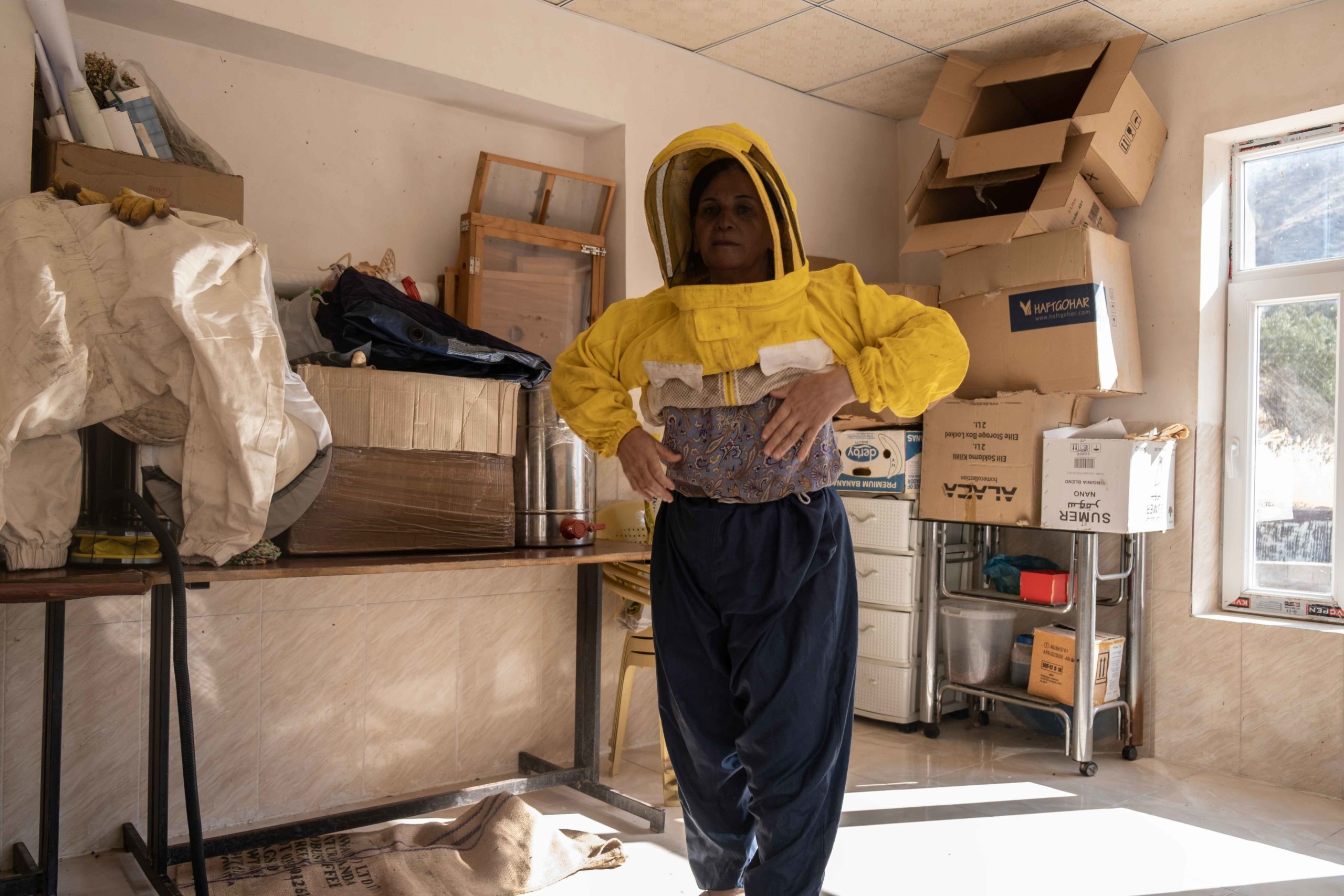
Xabat Karim Hasan
Xabat has been in the beekeeping business since 1993. She entered this field while partnering and supporting her husband who is also a beekeeper. She supports her family financially through her work. Xabat has participated in many international and local festivals, promoting her local produce. Xabat and her husband strive to raise Kurdistan society’s awareness of beekeeping, with an aim to make a culture of beekeeping that is also profitable. They share their knowledge by volunteering to teach university students about agriculture and beekeeping.
“I’ve always encouraged my daughters to start their own businesses and provide for themselves and their families. Regarding work, there is no distinction between men and women. Every woman who strives towards a goal should never let discouragements from society make them give up.”
خەبات کریم حسن
خەبات لە ساڵی ١٩٩٣ وە مێشەوانی دەکات. ئەو هاتە ناو ئەم بوارەوە بۆ پاڵپشتی هاوسەرەکەی کە ئەویش مێشەوانە. هاوکاری دارایی خێزانەکەی دەکات. لە زۆرێک فیستیڤاڵی نێودەوڵەتی و ناوخۆیی بەشداری کردووە و بەرهەمەکانی خۆی خستۆتەڕوو. خۆی و هاوسەرەکەی کۆشش دەکەن بۆ بڵندکردنەوەی هوشیاری کۆمەڵگەی کوردی دەربارەی مێشەوانی، بە مەبەستی هێنانی کەلتووری مێشەوانی کە دەبێتە مایەی قازانجی داراییش. خۆی و هاوسەرەکی ئەزموون و شارەزایی خۆیان هاوبەش دەکەن لەڕێگەی کاری خۆبەخشی و فێرکردنی خوێندکارانی زانکۆ دەربارەی کشتوکاڵ و مێشەوانی.
“هەمیشە هانی کچەکانی خۆم داوە کاری سەربەخۆی خۆیان هەبێت و قوتی خۆیان و خێزانەکانیان دابین بکەن. هیچ جیاوازییەک نییە لەنێوان ژن و پیاو لە کاردا. هەر ژنێک کە کۆشش دەکات لەپێناو ئاواتەکانی نابێت هەرگیز لێ بگەڕێت کۆمەڵگە ساردی بکەنەوە و واز بێنێت.”
SEED Foundation
SEED Foundation is a women-led, local non-governmental organization (NGO) in the Kurdistan Region of Iraq (KRI), committed to protect, empower, and support the recovery and reintegration of survivors of violence and others at risk.
Founded in 2014, SEED brings together local and global expertise to help build a more equitable Kurdistan and address the most critical challenges faced in the region today.
Metrography
Metrography is the first photo agency in the Kurdistan Region and Iraq. It was founded in 2010 by Kurdish-Iraqi photographer Kamaran Najm and American photojournalist Sebastian Meyer, with the objective of establishing an independent photojournalism industry in Iraq that breaks down ethnic, cultural, and religious barriers, fosters peer-to-peer collaboration and learning, and celebrates Iraq’s diversity and history. Over the years, Metrography has gained worldwide recognition. The work of its photographers has been exhibited internationally and published on some of the most renowned media outlets.
دەزگای سیید
دەزگای سیید رێکخراوێکی ناحکومی ناوخۆییە لە هەرێمی کوردستان کە ژن بەڕێوەی دەبات و پابەندە بە پاراستن و بەهێزکردن و پاڵپشتی باشبوونەوە و دوبارە تێکەڵبوونەوەی رزگاربووانی توندوتیژی و ئەوانەی لەژێر مەترسی توندوتیژیدان.
مێترۆگرافی
ئاژانسی مێترۆگرافی یەکەمین ئاژانسی فۆتۆگرافییە لە کوردستان و عێڕاق. ساڵی ٢٠١٠ لە لایەن کامەران نەجم، فۆتۆگرافەری کوردی عێراقی و سێباستیان مایەر، فۆتۆگرافەری ڕۆژنامەوانیی ئەمریکییەوە دامەزراوە بە ئامانجی دروستکردنی ناوەندێکی سەربەخۆی فۆتۆی ڕۆژنامەوانی لە عێراق و هەرێمی کوردستان کە بەربەستە نەتەوەیی، کلتووری و ئایینییەکان تێکدەشکێنێت و هانی کاری پێکەوەیی و فێربوون دەدات و گرنگی بە مێژوو و فرەرەنگی عێراق دەدات.
لە ماوەی ئەو ساڵانەدا مێترۆگرافی دەستخۆشی و پێزانینی جیهانی بەدەستهێناوە و کاری فۆتۆگرافەرەکانیشی لەسەر ئاستی نێودەوڵەتی پیشاندراون و لەلایەن هەندێک لە میدیا هەرە بەناوبانگەکانەوە بڵاوکراونەتەوە.
